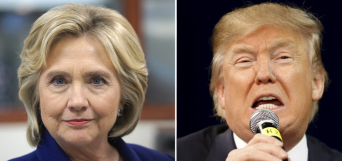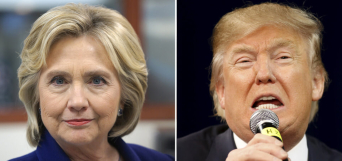Donald Trump has said that if elected president he will abolish the "Johnson amendment" which prevents churches and other religious bodies from campaigning politically.
Introducing his Catholic running mate, Indiana Governor Mike Pence in New York on Saturday night, the presumptive Republican candidate said: "We're going to get rid of that horrible Johnson amendment and we're going to let evangelicals, we're going to let Christians and Jews and people of religion talk without being afraid to talk".
Trump has excited evangelicals with the move, which comes amid a growing tilt for the Christian vote. An appeal which, so far at least, appears to be succeeding.
OK, so what exactly is this Johnson amendment?
It was sponsored by former Democrat president Lyndon Johnson in 1954 when he was a Texas senator, and it's an amendment to the federal tax code which limits political activities for non-profit organisations that are classified as tax exempt.
The Johnson Amendment states that bodies which are exempt from federal income tax cannot: "Participate in, or intervene in (including the publishing or distributing of statements), any political campaign on behalf of – or in opposition to – any candidate for public office."
The IRS says on its website: "Section 501(c)(3) organizations are absolutely prohibited from directly or indirectly participating in, or intervening in, any political campaign on behalf of (or in opposition to) any candidate for elective public office."
Supporters of the amendment argue that it helps cement the separation of church and state in the US, and prevented minorities such as blacks from being discriminated against during the civil rights movement.
Opponents say that Johnson was attempting to silence pastors who may have been critical of his agenda, including on civil rights.
Did Trump just come up with this to coincide with announcing his running mate?
Not quite, to be fair. Trump may be relatively new to the debate, but he has mentioned it a few times on the campaign trail and last month he heralded his plan to abolish the amendment as "my greatest contribution to Christianity".
Trump said: "I think maybe that will be my greatest contribution to Christianity — and other religions — is to allow you, when you talk religious liberty, to go and speak openly, and if you like somebody or want somebody to represent you, you should have the right to do it".
So, Trump's pretty fired up about it then?
You could say that. Last week, he excitedly called Jerry Falwell Jr, the Liberty University president and a long-time opponent of the amendment, and woke him up with news of his plan.
"He was so excited," Falwell said. "After 30 years of the so-called conservative leaders who have been elected by evangelicals, none of them thought to advocate for the repeal of the Johnson amendment, giving evangelical leaders political free speech. ... He thinks it is going to be a revolution in the Christian world."
But what's he really up to?
It is all part of a strategy – if that's not too flattering a word – to win over the evangelical vote ahead of the presidential election in November.
Polling suggests that so far Trump's approach is working, with four-fifths of white evangelicals apparently planning to vote for the maverick Republican, albeit somewhat reluctantly and despite his colourful private life and controversial, confrontational style.
"This [the proposed abolition of the Johnson amendment] is something that could make a difference with Christian voters in the fall," Falwell told Time magazine. "It is almost as important for Christians as the appointment of Supreme Court justices."
Falwell is an open, early supporter of Trump, and when he endorsed former Arkansas Governor Mike Huckabee in the 2008 presidential race, Americans United for the Separation of Church and State complained to the IRS and called for an investigation of Liberty University.
OK. But will the amendment actually be abolished?
That depends, of course, on whether Trump defeats Hillary Clinton, who has not questioned the amendment. Conventional wisdom is against that happening, but with the increasing rise of populism and divisive politics throughout the world, all bets, surely, are off.
















